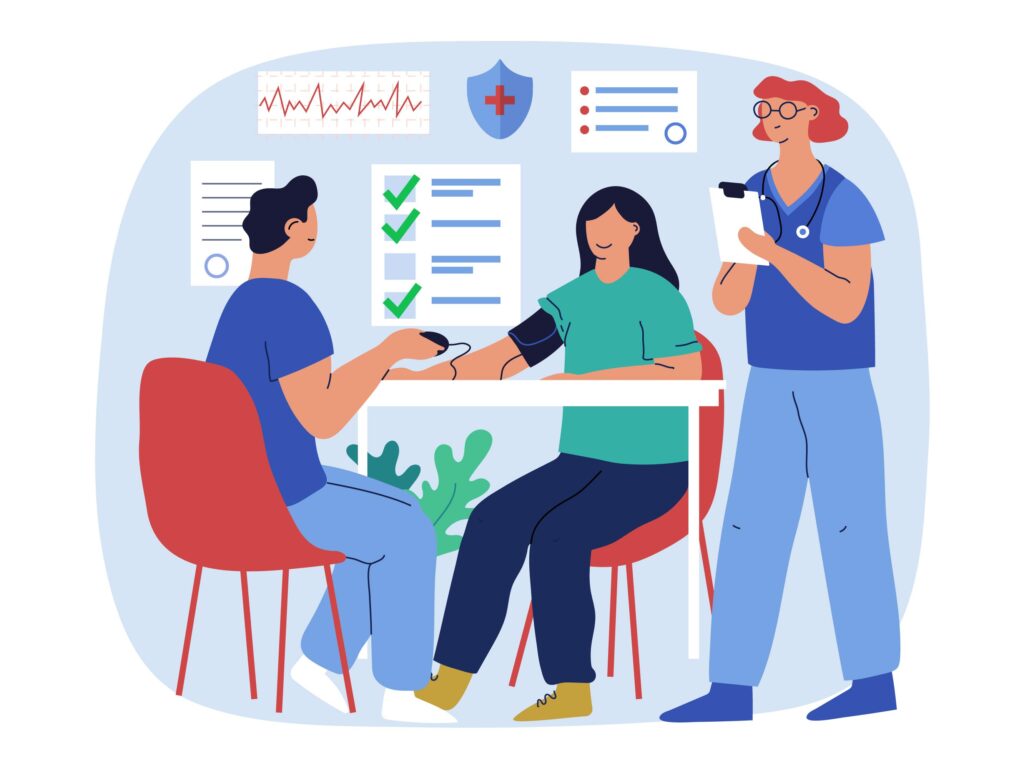The Connection Between Diabetes and Infertility: A Complete Guide

The Connection Between Diabetes and Infertility: Guide to Improve Fertility
Trying to conceive when you have diabetes can be challenging. Diabetes impacts fertility in both men and women, so it’s important to understand the relationship between diabetes and infertility. In this comprehensive guide, we’ll explain how diabetes affects fertility and the steps you can take to improve your chances of conception. We’ll also cover when you may need to see a fertility specialist for treatments like IVF or IUI if you are suffering from diabetes in case of male or female diabetic condition. Let’s dive into this article to discuss the Connection Between Diabetes and Infertility and Learn how diabetes affects fertility in both men and women. Discover treatments for diabetes and infertility that can be used together to improve the chances of conception.
Connection Between Diabetes and Infertility and How Diabetes Impacts Fertility
Diabetes can interfere with the reproductive system in a few key ways that make getting pregnant difficult:
- Insulin issues lead to irregular ovulation and menstrual cycles in women
- Diabetes increases the risk for PCOS, which causes infertility
- Poor blood sugar control damages sperm health in men
- Nerve and blood vessel damage contributes to erectile dysfunction
Understanding the specifics of how diabetes influences fertility is the first step to overcoming the challenges it presents. Let’s explore in more detail how diabetes affects conception for both women and men.
The key is optimizing blood sugar management as much as possible. Work closely with your endocrinologist to keep your A1C levels under 6.5%. Making positive lifestyle changes like eating healthy, exercising, and lowering stress is also important.
Target Blood Sugar Levels for Diabetic Fertility
| Metric | Optimal Range |
| Fasting blood glucose | 70-99 mg/dL |
| HbA1c | <6.5% |
| 2-hour postprandial glucose | <140 mg/dL |
While dealing with both diabetes and infertility can be disheartening, know that there are many effective medical treatments available. With diligent blood sugar control and the right approach, your chances of getting pregnant can significantly improve.

How Diabetes Impacts Fertility in Women
For women with diabetes, one of the main ways that diabetes interferes with fertility is by causing problems with ovulation.
Insulin Resistance and Ovulation Issues
Insulin plays an important role in the female reproductive system. It works with the ovaries and triggers them to release eggs for ovulation.
When a woman has insulin resistance, which often accompanies diabetes, the ovaries can have trouble responding to the insulin signals appropriately. This impairs the ovulation process.
Without proper ovulation, the menstrual cycle becomes irregular and it’s difficult for the woman to get pregnant. Restoring insulin sensitivity and maintaining steady blood sugar levels helps encourage normal ovulation cycles.
Impact of Diabetes on Female Fertility
| Issue | Description |
| Irregular ovulation | Insulin resistance disrupts ovulation signals between pancreas/ovaries |
| PCOS | Diabetes and PCOS fuel each other’s insulin/androgen issues |
| Poor egg health | Hyperglycemia damages egg quality and development |
Polycystic Ovarian Syndrome (PCOS)
Women with diabetes also have a higher risk of developing polycystic ovarian syndrome (PCOS). PCOS and diabetes share an underlying issue with insulin resistance.
PCOS causes a hormonal imbalance where the ovaries produce an excess of androgens like testosterone. This prevents the ovaries from releasing eggs regularly.
The interaction between insulin resistance, diabetes, and heightened androgens creates a vicious cycle that further disrupts ovulation and fertility. Treating the insulin resistance component is key to managing PCOS for women with diabetes.
Effect of High Blood Sugar on Egg Quality
Finally, when blood sugar levels are consistently too high, it can damage egg health and viability. Hyperglycemia causes the eggs to develop abnormally and reduces their quality.
This makes conception more difficult and also increases the risk of miscarriage if fertilization does occur. Tight blood sugar control helps nurture healthy egg development.
The Interconnection between PCOS, Infertility, and Diabetes
| Condition | Link to Other Conditions | Impact on Fertility |
| PCOS | – Caused by underlying insulin resistance – Worsens insulin sensitivity | – Lack of ovulation prevents conception – Hyperandrogenism disrupts reproductive hormones |
| Diabetes | – Insulin resistance contributes to PCOS – PCOS worsens insulin issues | – Poor blood sugar control impairs ovulation – Hyperglycemia damages eggs |
| Infertility | – Resulting issues from both PCOS and diabetes | – Requires fertility treatments beyond diabetes management alone |

How Diabetes Affects Male Fertility
For men, diabetes also negatively impacts fertility in a few key ways:
Impact of Diabetes on Sperm Health
Chronically high blood sugar damages sperm at the cellular level. It leads to issues like:
- DNA damage
- Poor sperm motility (ability to swim and move)
- Abnormal sperm shape (morphology)
This combination of sperm abnormalities makes it challenging for the sperm to reach and fertilize the egg.
Controlling blood glucose minimizes the degree of sperm damage and dysfunction. This helps increase the likelihood of conception.
Erectile Dysfunction
Diabetes frequently causes issues with sexual performance and erectile dysfunction (ED) in men.
The vascular and nerve damage that accompanies diabetes interferes with the biological mechanisms involved in getting and maintaining an erection.
Treatments for ED in diabetic men include medications like Viagra, medical devices like penis pumps, and sometimes surgery. Improving blood sugar control also helps minimize ED issues.
Retrograde Ejaculation
Finally, diabetic nerve damage can sometimes affect the muscles that control ejaculation. This causes a condition called retrograde ejaculation.
Instead of exiting the penis during orgasm, the semen goes backward into the bladder. This prevents it from reaching the female reproductive tract.
Retrograde ejaculation is treatable through medications and blood sugar optimization. Sperm can also sometimes be retrieved directly from the bladder for certain fertility procedures.
How Diabetes Affects Male Fertility
Diabetes can negatively impact multiple aspects of male fertility and sexual function.
Male Sexual Dysfunction Related to Diabetes
| Condition | Prevalence in Diabetic Men | Cause |
| Erectile dysfunction | 35-75% | Nerve/vascular damage limits blood flow |
| Retrograde ejaculation | 1-35% | Nerve damage affects emission control |
| Low testosterone | 25-50% | Insulin resistance reduces production |
Impact of Diabetes on Sperm Health
High blood sugar from uncontrolled diabetes causes issues like:
- DNA fragmentation – The sperm DNA becomes damaged, affecting the genetic integrity of sperm. This makes it harder to achieve fertilization and increases miscarriage risk.
- Poor sperm motility – The sperm have difficulty moving properly and swimming. This impairs their ability to reach and penetrate the egg.
- Abnormal morphology – The size and shape of the sperm become defective. This prevents sperm from being able to fertilize eggs.
Bringing blood sugar levels down into a healthy range can help improve sperm parameters like movement, shape, and DNA integrity. This boosts the chances that the sperm will be fit enough to achieve conception.
Erectile Dysfunction
Erectile dysfunction (ED) is a common complication of diabetes, affecting 35-75% of diabetic men.
Diabetes damages the blood vessels and nerves that control erections. Anything that interferes with blood flow into the penis or signals from the brain can prevent men from getting or maintaining an erection suitable for intercourse.
Treatments for ED include:
- Oral medications like Viagra, Cialis, Levitra
- Penis pumps and vascular reconstruction surgery
- Lifestyle changes like weight loss, limiting alcohol, and smoking cessation
Controlling diabetes through medication, diet, exercise, and stress reduction can also help minimize erectile dysfunction issues.
Retrograde Ejaculation
In some cases, diabetes can cause issues with the muscles that control the outflow of semen during ejaculation.
When these muscles are damaged, semen ends up going backward into the bladder instead of exiting the penis. This condition is called retrograde ejaculation.
Retrograde ejaculation prevents pregnancy because the semen cannot reach the female reproductive tract. It requires treatment with medications and blood sugar optimization.
In fertility procedures like IVF, sperm can sometimes be retrieved directly from a man’s bladder and used for insemination when retrograde ejaculation is present.

Treating Diabetes and Infertility Together
When dealing with both diabetes and infertility, it’s important to address both conditions together through an integrated treatment approach.
Optimizing Blood Sugar Control
Getting blood glucose levels down to a healthy range is the foundation for improving fertility. Treatment options include:
- Diabetic diet – Eating foods low on the glycemic index that minimize spikes in blood sugar. Emphasize lean proteins, high fiber carbs, healthy fats, and avoiding added sugars.
- Regular exercise – Aim for 30-60 minutes daily to help insulin work effectively and keep glucose levels balanced.
- Weight loss – Losing excess body fat through diet and exercise can significantly improve insulin sensitivity.
- Oral medications – Diabetes pills help lower blood sugar levels by various mechanisms of action:
- Metformin – Improves insulin sensitivity and reduces glucose production
- Sulfonylureas & meglitinides – Increase insulin secretion
- DPP-4 inhibitors – Slow digestion of carbs
- SGLT2 inhibitors – Block kidney glucose reabsorption
- Combination therapies
- Injectable treatments – Insulin injections or GLP-1 agonists administered subcutaneously help when diabetes pills aren’t enough.
Closely monitor blood glucose through frequent testing along with hemoglobin A1c every 3-6 months. Work with an endocrinologist to optimize medications and lifestyle.
Fertility Treatments
Once blood sugar is stabilized, fertility treatments can further increase the chances of conception.
- Ovulation induction – Fertility drugs taken orally or by injection stimulate ovulation in women:
- Clomiphene citrate – Selective estrogen receptor modulator
- Letrozole – Aromatase inhibitor
- Gonadotropins – FSH and LH injections
- Intrauterine insemination (IUI) – Washed sperm are inserted directly into the uterus when ovulating to facilitate conception.
- In vitro fertilization (IVF) – Eggs are retrieved and fertilized outside the body, then transferred back into the uterus as embryos.
- Surgery – To correct issues like blocked fallopian tubes, endometriosis, fibroids, or varicoceles if needed to enable pregnancy.
Common Fertility Medications used for the treatment of infertility
| Type | Names | Purpose |
| SERMs | Clomiphene, tamoxifen | Ovulation induction |
| Aromatase inhibitors | Letrozole | Ovulation induction |
| Gonadotropins | FSH, LH | Stronger ovulation stimulation |
Complementary treatments like acupuncture may support fertility treatment efforts as well. Pursue an integrated plan customized to your medical needs through a reproductive endocrinologist.

When to See a Fertility Specialist
If you have diabetes and have been trying to conceive unsuccessfully for some time, seeing a reproductive endocrinologist is recommended. Here are some general guidelines on when to get a fertility workup:
- Trying to conceive for 6 months without success (or 1 year if over age 35). Fertility experts can help identify any issues preventing pregnancy.
- Known fertility problems like PCOS, endometriosis, or recurrent pregnancy loss. A reproductive endocrinologist can provide treatments tailored to your condition.
- If you are over age 35. Female fertility gradually declines after 35, so it’s ideal to evaluate sooner rather than later.
- Male fertility issues like very low sperm counts or motility. A specialist will assess treatment options such as sperm aspiration or IVF with ICSI.
- Hypothalamic amenorrhea – Absence of menstrual periods often caused by low body weight, stress, or too much exercise. Managing the underlying issue can help restore ovulation.
- Any structural problems or abnormalities found during reproductive health exams. Issues that may require fertility treatments in order to conceive.
Don’t hesitate to ask your gynecologist or primary care provider for a referral to a fertility specialist if you have diabetes and have been unsuccessful in achieving pregnancy. They can run tests, provide treatment recommendations, and improve your chances.
The Bottom Line
Dealing with both diabetes and infertility can seem daunting, but effective treatments are available. The key is diligent blood sugar management combined with fertility therapies as needed.
With blood glucose levels in a healthy range, many diabetics can conceive without advanced reproductive treatments. Make lifestyle modifications, work with your endocrinologist to optimize medications, and keep up open communication with all your doctors.
For those who need more than just diabetes control, don’t hesitate to pursue options like fertility drugs, IUI, or IVF. There are many pathways to building your family with diabetes.
IUI vs. IVF Comparison
| Factor | IUI | IVF |
| Description | Washed sperm inserted into the uterus | Eggs retrieved and fertilized outside the body |
| Success rates | 10-15% per cycle | >50% cumulative for 3 cycles |
| Cost per cycle | $300-$800 | $12,000-$17,000 |
Most importantly, stay positive in your journey to conception as a diabetic. Although it can be challenging, you can overcome infertility and experience the joys of parenthood. Trust your medical team, focus on your health, and don’t give up hope.
If you’d like to learn more about IVF, Egg Donation, or surrogacy services globally, check out the rest of our website at Complete Surrogacy. We offer legally secure and affordable surrogacy consulting services for FREE.
Our team has over 13 years of experience facilitating surrogacy arrangements, egg donation, and serving as an advocacy resource for infertile couples and LGBTQ individuals seeking to build families.
Our founder and chief surrogacy consultant, Neelam Chhagani, passionately help couples struggling with fertility challenges. Since starting our surrogacy consulting agency in 2013, we’ve helped welcome over 500 babies for intended parents nationwide.
Our team includes experts from diverse backgrounds with leading reproductive attorneys, professionally trained top fertility doctors, former surrogacy case managers, experienced and kind surrogate mother and egg donor coordinators, mental health professionals specializing in infertility counseling, and a logistic support team to assist you in your chosen surrogacy country.
For more resources on IVF and Surrogacy, browse our other web page- IVF Conceptions.

Relationship Between Diabetes and Infertility FAQ
1. How does diabetes affect fertility?
Diabetes is a condition that affects blood sugar levels and hormonal balance in the body. Both men and women with diabetes can experience fertility issues due to these imbalances. In men, diabetes can lead to decreased sperm quality, motility, and sperm count, making it more difficult to conceive. In women, diabetes can disrupt the reproductive system, leading to hormonal imbalances and irregular menstrual cycles, which may affect their ability to get pregnant.
2. What is the relationship between type 2 diabetes and infertility?
Type 2 diabetes mellitus is known to have a negative impact on fertility in both men and women. High blood sugar levels and insulin resistance associated with type 2 diabetes can lead to hormonal disturbances and decrease sperm quality in men. In women, it can cause irregular ovulation and menstrual cycles, making it harder for them to conceive.
3. Can type 1 diabetes affect fertility?
Yes, type 1 diabetes mellitus can affect fertility in women. Women with type 1 diabetes may have difficulty getting pregnant due to irregular menstrual cycles and hormonal imbalances caused by fluctuations in blood sugar levels.
4. Can diabetes cause infertility in men?
Yes, diabetes can cause infertility in men. High blood sugar levels and damage to the blood vessels and nerves can negatively impact sperm quality, motility, and count, leading to fertility issues.
5. How does diabetes affect sperm quality?
Diabetes can damage the blood vessels and nerves that supply the reproductive system, leading to decreased sperm quality. It can cause DNA damage to sperm cells and affect their motility, making it harder for them to fertilize an egg.
6. Can diabetes lead to infertility in women?
Yes, diabetes can contribute to infertility in women. The hormonal imbalances and irregular menstrual cycles caused by diabetes can make it more difficult for women to conceive.
7. What are the treatment options for infertility in individuals with diabetes?
The treatment options for infertility in individuals with diabetes depend on the specific circumstances and underlying causes. It may include lifestyle changes, medication management of blood sugar levels, hormone therapy to regulate ovulation, assisted reproductive technologies such as in vitro fertilization (IVF), or consulting a fertility specialist at a fertility clinic for personalized guidance.
Reference used:
Effect of diabetes on male infertility
Fertility issues in woman with diabetes
Disclaimer:
All legal information on this website is intended only as a guide and is not a replacement for the opinions of licensed legal professionals/Medical professionals. Some information may have changed since the time of publication. We advise you to consult a licensed attorney/Medical expert with authority in fertility/surrogacy processes.














I was introduced to Neelam by a friend who worked with Neelam for surrogacy. Neelam is absolutely wonderful. I am a single male and the journey to fatherhood is not that easy. Neelam connected me to a program ideal for my circumstances. She was with me throughout the pregnancy providing advice and guidance along the way. I am so grateful I found her and am thrilled today that I have a beautiful daughter. I highly recommend Neelam to anyone who is on a journey to become a parent. Having a child has changed my world for the better. I wish others success with their own journey and recommend you connect with Neelam to find a path that is best for you.
SA (USA)